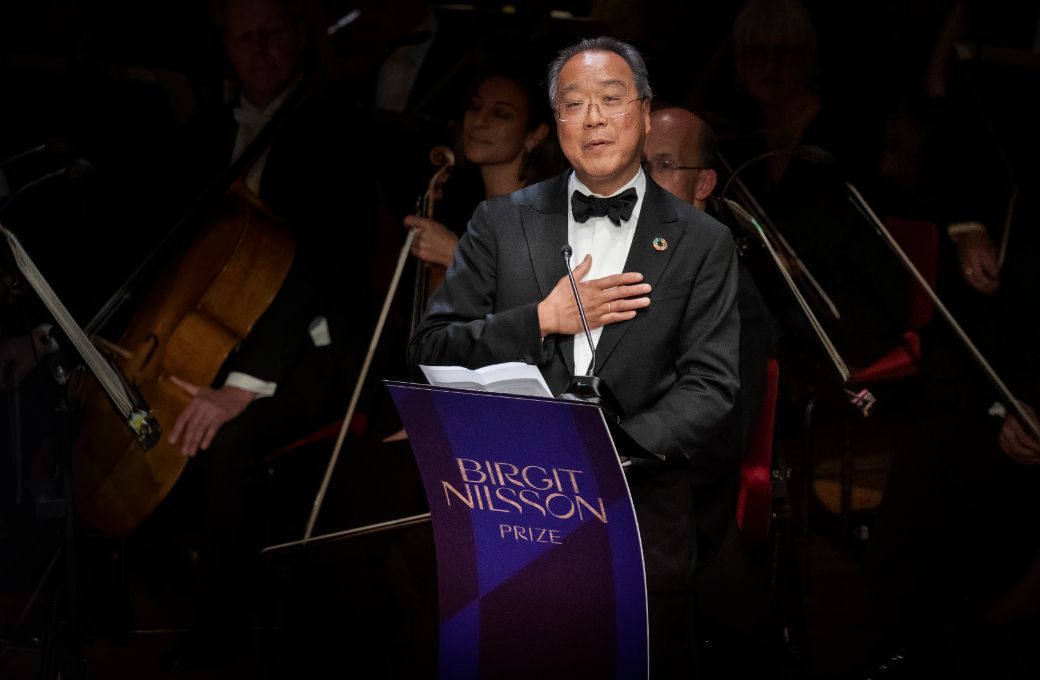Supreme cellist Yo-Yo Ma last night received the million-dollar Birgit Nilsson Prize, pledging to lead his life by her example, making art in the service of society “with joy and humour, and staying close to nature”. He pointed out that the great soprano – who sang so exceptionally for four decades – actually spent more than half her life in Skåne, feet firmly on the ground, “a life in balance with others and with our planet”.
Ma won the prize, presented by the King of Sweden, not only for his exceptional musical talent but also for his enduring belief that culture can generate trust and understanding between peoples, describing it as a means to “bridge our divides, turning the ‘other’ into ‘us’”. He will use the prize money to explore connections between culture and the natural world in an ambitious project where he will work with geologists, biologists, astronomers, indigenous communities and scientists under the theme of Music, People, Planet.
Birgit Nilsson’s values were shaped on the farm of her childhood in Svenstad, surrounded by the landscape and sea of the Bjäre peninsula, her profound views on the wider world, life and music sustaining her throughout her long career and drawing her back to her home when she finally left the stage in 1982. The prize in her memory is usually awarded every third year to an artist or institution that has made a major contribution to classical music. La Nilsson died in 2005, having secretly chosen Plácido Domingo to be the first recipient of the prize, awarded in 2009. Subsequent winners have been Riccardo Muti (2011), the Vienna Philharmonic Orchestra (2014) and Nina Stemme (2018).
Recipients do not perform on the night they receive the prize – Stockholm had heard Ma storm through Dvořák’s Cello Concerto two nights before. Instead, the Birgit Nilsson Foundation chose to celebrate Ma (seated at the front of the auditorium next to the King and Queen) with a programme featuring some of the best musical talents the nation has to offer.

Video of Nilsson singing “Dich, teure Halle” from Wagner’s Tannhäuser was followed by the Swedish Radio Choir joining the Royal Swedish Opera Chorus in the Entry of the Guests from the same opera, the evening’s conductor Patrik Ringborg marshalling the forces of the Royal Stockholm Philharmonic Orchestra and twelve trumpeters, placed around the Konserthuset’s balcony: a gloriously opulent way to begin the celebrations.
We were brought back down to earth by Hugo Alfvén’s Midsummer Vigil, his Swedish Rhapsody no. 1, its bucolic burbling reflecting something of the rural life that Nilsson would have known. This is very much the RSPO’s terrain; they own this music and plainly enjoy its charming, lyrical beauty and melodic quirkiness – bassoon and oboe staggering along as the drunken midsummer revellers; strings marking out the sprightly dance with characteristic vigour.
The sopranos of the Swedish Radio Choir had the unenviable task of starting Richard Strauss’ unaccompanied motet Der Abend on a pianissimo top G. The 30 singers, divided into 16 parts, stepped out onto this slippery ice rink of a piece with admirable assurance, handling its shifting tonality with aplomb as it slid towards it conclusion.
It fell to Swedish cellist Amelie Stalheim to remind us that we were in the hall to honour a great exponent of her instrument, and she didn’t disappoint, playing an extract from Anders Hillborg’s Cello Concerto which seemed so appropriate for the evening’s theme of harmony with the planet. Hillborg creates another world in this piece. We feel as though we are swimming through an underwater wonderland, full of strange and beautiful creatures. At a press conference earlier, Ma had talked eloquently about the natural world and the wonder, for instance, of whale song. Here was a theme that seemed to draw directly on such a phenomenon, played vibrato-less, haunting and elegiac, mysterious and beautiful.
To close, exceptional young Swedish singers Johanna Wallroth (soprano) and Emma Sventelius (mezzo) – both past recipients of the Birgit Nilsson stipendium – charmed and dazzled in the trio and final scene of Strauss’s Der Rosenkavalier, where they were joined by soprano Maria Bengtsson and baritone Lars Johanson Brissman. It made a touching end to an evening of high quality music-making, a fitting tribute to a prizewinner of exceptional ability and grace.
Stephen's press trip to Stockholm was funded by the Birgit Nilsson Foundation.


